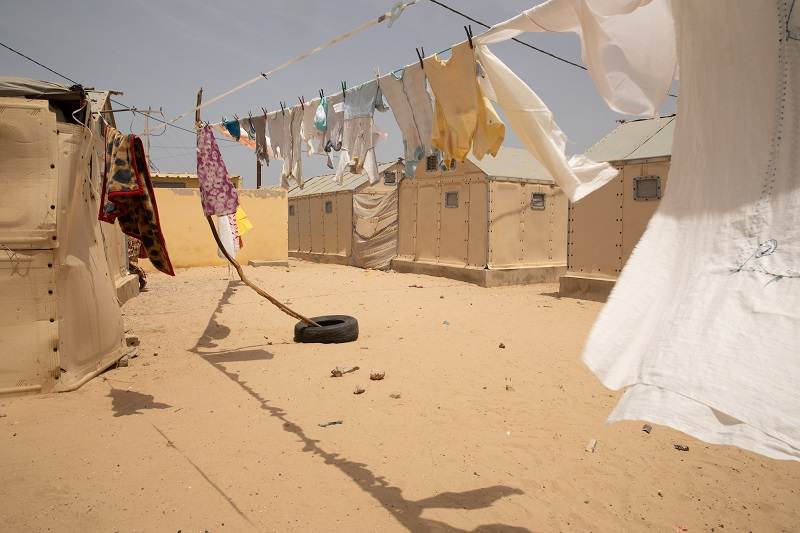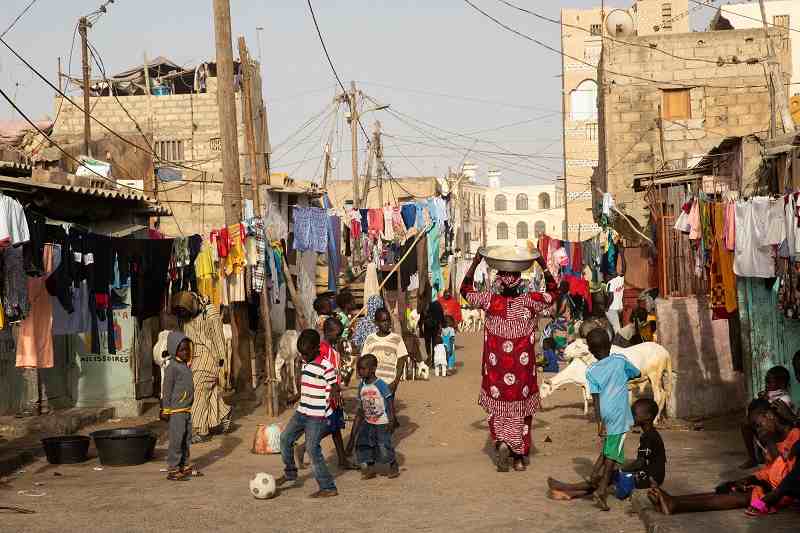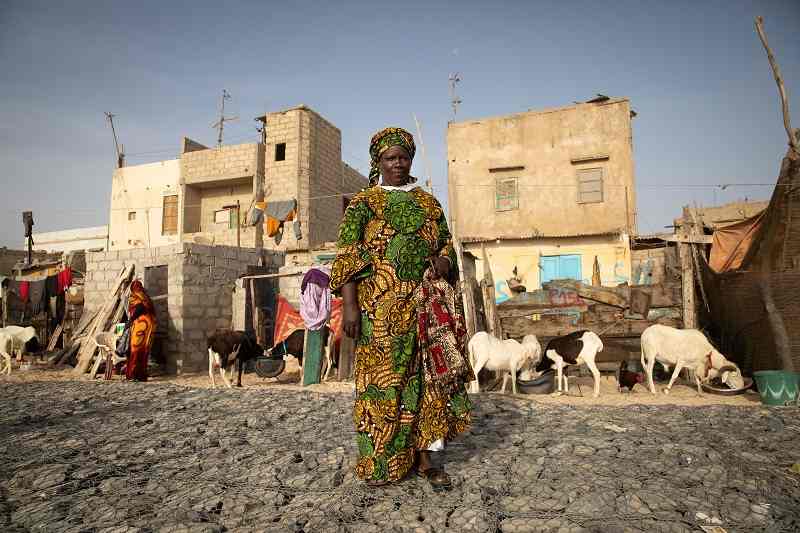
Langue de Barbarie – where Khady Sene lived until the sea washed her home away in 2018 – is one of the most vulnerable neighborhoods in Saint Louis, Senegal. It is pictured here on April 12, 2022.
17:06 JST, June 6, 2022
SAINT-LOUIS, Senegal – Four years had gone by since the waves swallowed her home, but there Khady Sene was again, stepping through the rubble. Rocks and sand littered what used to be her room, the room her grandfather built, the room where she was born.
“I even love the smell,” said Sene, 53, lifting her chin to the breeze. “The salty air. The fish. All of it.”
She had known to pack. The United Nations had named this city the most vulnerable to the rising sea in all of Africa. The tide lapped against her doorstep. Yet she struggled to let go, even after the government offered her a new house.
Alarm about the future of coastal communities has triggered a surge of disaster management financing in Senegal, and the government is using it to move thousands of people away from the encroaching ocean. But the $93 million project, hailed as a model for urban planners, faces a major roadblock: Many residents refuse to leave.
“They can move us,” Sene said, “but they cannot move our spirits.”
While cities across the world must contend with the growing tide as the Earth heats up, developing nations face the greatest risk. Rates of sea level rise have more than doubled in recent decades, scientists say, as reliance on fossil fuels hastened the melting of ice sheets and glaciers.
In sub-Saharan Africa, up to 86 million people will have to relocate because of climate change by 2050, more than anywhere else on Earth. Thousands in Saint-Louis have already lost their homes or live in what authorities call “extremely high-risk zones.”
Researchers in Senegal found that 80 percent of the city could be underwater by 2080, erasing this world heritage site celebrated for its architecture while uprooting 150,000 people.
Sene had tried to keep the threat off her mind. For generations, her family lived on a peninsula between the sea and the Senegal River called Langue de Barbarie. A canal built to ease the flooding accidentally made it worse.
No one wanted to give up the community of open doors, where neighbors pooled money for emergencies and shared plates of grilled fish. Sene couldn’t walk 10 feet, she said, without stopping to chat with someone.
They depended on the ocean. Men drifted out in colorfully painted pirogues, netting sea bass and sardines. Women bought heaps to season and sell, a trade Sene learned from her mother, who learned from her mother.
Then saltwater tore through her door one evening in March 2018, sweeping away her bed, family photos and sense of belonging.
Yes, she had known to pack. She just couldn’t bring herself to start. “Not until it was too late,” she said, walking through the wreckage. “Not until we lost everything.”
Sene and her family escaped uninjured, but an elderly man and little boy she knew drowned. Officials urged people to leave. Many landed in tent camps. Sene huddled in one until she got the offer.
The struggle of a fresh start
Senegal launched in 2018 what leaders hailed as a blueprint for tackling the crisis of vanishing coasts. With loans from the World Bank totaling $80 million, and another $13 million from state coffers, the government aimed to move residents of Langue de Barbarie seven miles inland.
“A clear example for others who are dealing with this challenge,” said Insa Fall, an environmental consultant for the Saint-Louis Emergency Recovery and Resilience Project.
It is one of several ambitious efforts at adaptation worldwide. South Korea approved plans last year for a “floating city” of linked platforms. Farmers in Bangladesh have turned to buoyant seedbeds and salt-resistant rice.
Authorities in Senegal greenlit a settlement for climate refugees on plots previously earmarked for a football stadium. They installed a power grid, wells and communal toilets in a village called Diougop. They opened a school, a hair salon and a general store. They erected hundreds of temporary shelters. Construction on the permanent housing is set to begin this month.

The Diougop settlement, seven miles inland from the bustling and crumbling Langue de Barbarie coastline is windy, dusty and barren.
About 1,500 people from Langue de Barbarie moved in, with thousands more invited, according to Senegal’s Municipal Development Agency. But persuading everyone in harm’s way to relocate is the biggest obstacle, said Marie Solange Ndione, a social adviser on the project.
“They are extremely attached to the land,” she said.
Sene has been her family’s breadwinner since her husband got sick. They are responsible for five children of their own and six more after her sister died of heart failure.
That was why they hadn’t lingered on Langue de Barbarie, camping in ruins with other holdouts. Sene wanted to protect them.
The family crammed into three rooms, which also housed their sheep. “We shouldn’t be living like animals,” one of her sons-in-law told her.
But Sene urged patience, even though the temporary shelter got too hot. Even though, away from the sea, she felt her skin drying out.
She waited and waited for her permanent house. She thought it would be finished last year. Developers, who said they have spent a small fraction of the budget so far, blamed delays on sorting out who should get what, among other logistical hurdles.
“I am grateful for safety,” she said. “But it is so hard to live this way.”
The settlement looked oddly empty on a recent evening, nothing like the dusty alleyways of Langue de Barbarie, where children played and sheep bleated and old men sat outside blasting the radio. A couple of the shelters seemed to be abandoned. One had cobwebs.
How many people still lived here?
“Hundreds. Maybe 1,000,” said Mamadou Thiam, chairman of the resident management committee, who also lost his home to the waves, “but people go back to the sea during the day and sleep here at night.”

Langue de Barbarie on April 12, 2022. Thousands of people have either lost their homes or reside in what authorities call “extremely high-risk zones.”
The cities in Senegal are already crowded, officials say, so they must find other places where climate refugees can start over. Planners have encouraged the Diougop newcomers to enroll in free job training and swap their marine livelihoods for construction, farming, catering, grooming or tailoring. None have a car, and trekking back to Langue de Barbarie can take two hours by bus.
“Fishermen have to go to sea very early around 5 a.m. and usually come back very late,” said Marie Ndaw, a civil engineer at the Municipal Development Agency, “and the bus lines do not cover these needs.
Sene considered the free catering course. But she preferred her fish business.
“It keeps me connected to my roots,” she said.
Most mornings, she competes for a bus seat. The shore still feels like home.
The desire to stay
Sene’s fisherman buddies rang her cell in the evenings when they expected a big haul. Sometimes, she bought enough of their catches to need a horse cart. In a good month her salting business made $80.
Whenever she could, she visited her family’s old land. The ocean had obliterated her rooms, but her brother’s walls still stood.
“I’ve missed you,” he said as she wandered over. They hadn’t caught up in weeks. He rarely visited the settlement.
“You should join us,” she said.
“I would rather wait for the waves to take me,” he replied.
She buried her face in her hands.
Sene understood the desire to stay. Happy memories haunted her: running to the fishermen on the beach as a girl, delivering the sea bass to neighbors who rewarded her with five cents.
She told her brother she would see him later and stepped into the sand. Familiar faces surrounded her on the beach, a chorus of “Peace be with you!” “How’s the family?”
She ran into an imam, who split his time between two wives, one here, the other in Diougop. She greeted her old neighbor, 50-year-old Alioune Sarr, who lives in a partly collapsed home. A cat pawed through the debris of his former living room.
“The air is so fresh here,” Sarr said. “I’m not going to a camp that is all wind and dust.”
It’s not a camp, Sene countered. Real houses are coming soon.
“I can’t live on false promises from the government,” the man replied. Sarr was a fisherman. Moving inland would hurt his income. He didn’t want to jostle for a bus seat.
But he could die here, she said. They all could.
“I’d rather die with fresh air,” he said, “and nature.”
Sene lightly smacked his arm. Behind them, the waves crashed.

Khady Sene stands on the spot where her house used to stand until it was washed away in 2018, in Langue de Barbarie in Saint Louis, Senegal, on April 12, 2022.
Top Articles in News Services
-

Prudential Life Expected to Face Inspection over Fraud
-

Hong Kong Ex-Publisher Jimmy Lai’s Sentence Raises International Outcry as China Defends It
-

Japan’s Nikkei Stock Average Touches 58,000 as Yen, Jgbs Rally on Election Fallout (UPDATE 1)
-

Trump Names Former Federal Reserve Governor Warsh as the Next Fed Chair, Replacing Powell
-

Suzuki Overtakes Nissan as Japan’s Third‑Largest Automaker in 2025
JN ACCESS RANKING
-

Japan Institute to Use Domestic Commercial Optical Lattice Clock to Set Japan Standard Time
-

Israeli Ambassador to Japan Speaks about Japan’s Role in the Reconstruction of Gaza
-

Man Infected with Measles May Have Come in Contact with Many People in Tokyo, Went to Store, Restaurant Around When Symptoms Emerged
-

Prudential Life Insurance Plans to Fully Compensate for Damages Caused by Fraudulent Actions Without Waiting for Third-Party Committee Review
-

Woman with Measles Visited Hospital in Tokyo Multiple Times Before Being Diagnosed with Disease























